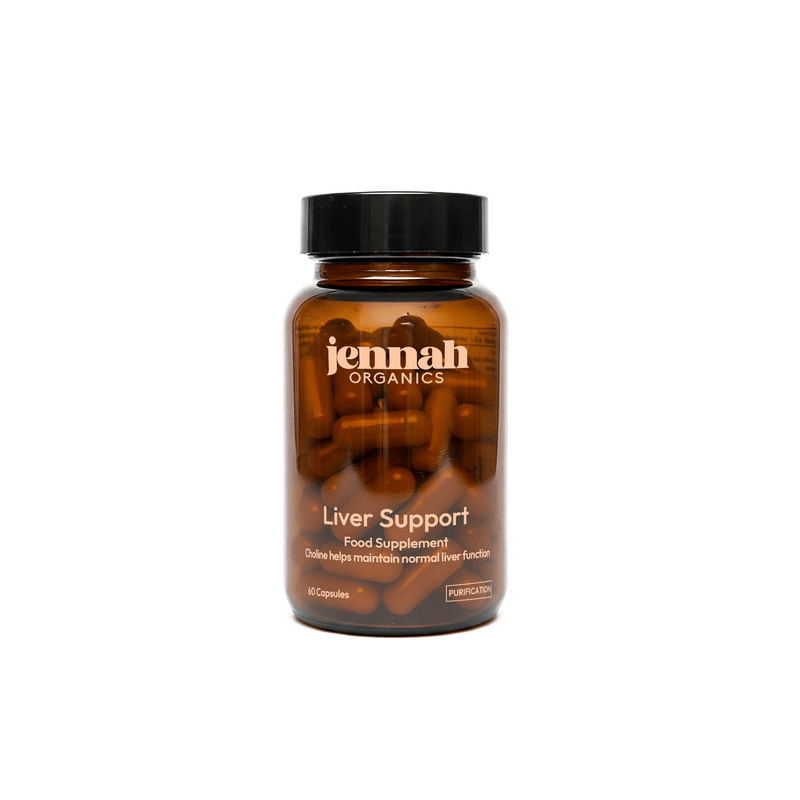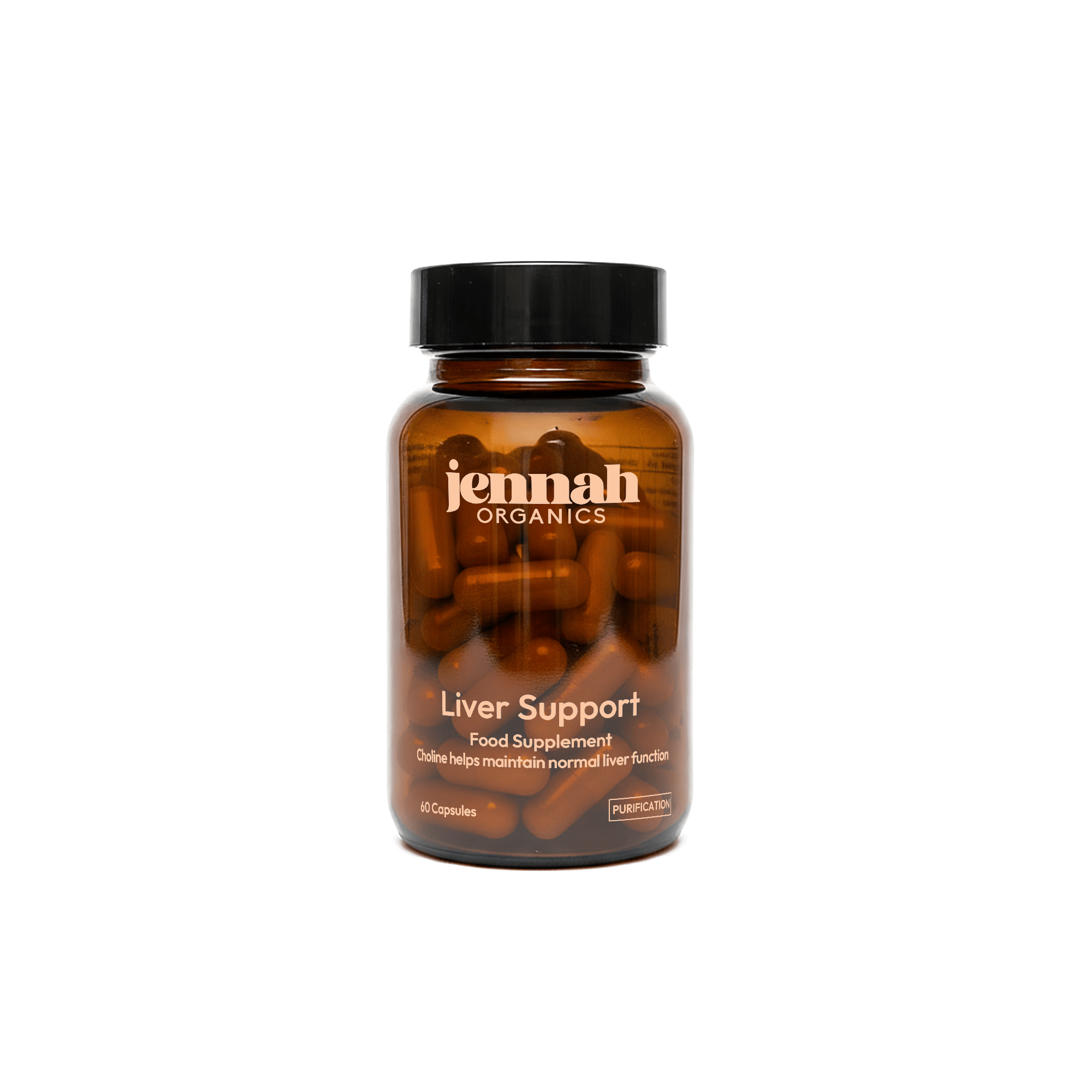Why You Never Feel Full (and How to Fix It Naturally)
Many people struggle with feeling hungry all the time, even after eating a full meal. It is not simply about willpower. Constant hunger often points to imbalances in...
Fri frakt vid köp över 700 kr*
 Flat Belly - Tarmdetox
Flat Belly - Tarmdetox
 Burn Boost - Naturlig fettförbrännare
Burn Boost - Naturlig fettförbrännare
 Hormone Balance - Hormonell viktkontroll
Hormone Balance - Hormonell viktkontroll
 Liver Cleanse - Leverdetox
Liver Cleanse - Leverdetox
 Crave Control - Få aptiten under kontroll
Crave Control - Få aptiten under kontroll
 BurnBoost – Provpaket (7x8 g portionsförpackningar)
BurnBoost – Provpaket (7x8 g portionsförpackningar)
 Magic Magnesium - Avslappning, hjärnhälsa & vila
Magic Magnesium - Avslappning, hjärnhälsa & vila
 Hair Growth - För längre hår och starkare naglar
Hair Growth - För längre hår och starkare naglar
 Collagen Care - Naturligt kollagen
Collagen Care - Naturligt kollagen
 Collagen Care – Provpåse (7x8 g portionsförpackningar)
Collagen Care – Provpåse (7x8 g portionsförpackningar)
 Magic Magnesium - Provpaket (7x8 g portionsförpackningar)
Magic Magnesium - Provpaket (7x8 g portionsförpackningar)
 Viktminskning & minska uppblåsthet-paket
Viktminskning & minska uppblåsthet-paket
 Bränn fett & krossa suget-duo
Bränn fett & krossa suget-duo
 Glow Essence - Lystergivande ansiktsserum med C-vitamin
Glow Essence - Lystergivande ansiktsserum med C-vitamin
 Total Reset-paket
Total Reset-paket
 Oriental Oasis - Lyxig hud- och hårolja med arganolja och druvkärnolja
Oriental Oasis - Lyxig hud- och hårolja med arganolja och druvkärnolja
 Silk Shine - För silkeslent och skinande hår
Silk Shine - För silkeslent och skinande hår
 Jennah Essentials
Jennah Essentials
 Glow-paket
Glow-paket
 Lugn & under kontroll-paket
Lugn & under kontroll-paket
 Perimenopauspaket
Perimenopauspaket
 Kortisolkontrollpaket
Kortisolkontrollpaket
 Flat Belly - Tarmdetox
Flat Belly - Tarmdetox
 Burn Boost - Naturlig fettförbrännare
Burn Boost - Naturlig fettförbrännare
 Hormone Balance - Hormonell viktkontroll
Hormone Balance - Hormonell viktkontroll
 Liver Cleanse - Leverdetox
Liver Cleanse - Leverdetox
 Crave Control - Få aptiten under kontroll
Crave Control - Få aptiten under kontroll
 BurnBoost – Provpaket (7x8 g portionsförpackningar)
BurnBoost – Provpaket (7x8 g portionsförpackningar)
 Viktminskning & minska uppblåsthet-paket
Viktminskning & minska uppblåsthet-paket
 Bränn fett & krossa suget-duo
Bränn fett & krossa suget-duo
 Total Reset-paket
Total Reset-paket
 Jennah Essentials
Jennah Essentials
 Kortisolkontrollpaket
Kortisolkontrollpaket
 Burn Boost - Naturlig fettförbrännare
Burn Boost - Naturlig fettförbrännare
 Hormone Balance - Hormonell viktkontroll
Hormone Balance - Hormonell viktkontroll
 Magic Magnesium - Avslappning, hjärnhälsa & vila
Magic Magnesium - Avslappning, hjärnhälsa & vila
 Hair Growth - För längre hår och starkare naglar
Hair Growth - För längre hår och starkare naglar
 Magic Magnesium - Provpaket (7x8 g portionsförpackningar)
Magic Magnesium - Provpaket (7x8 g portionsförpackningar)
 Total Reset-paket
Total Reset-paket
 Jennah Essentials
Jennah Essentials
 Jennah Ritual Mixer – Gör varje dos till ett ögonblick (Kopia)
Jennah Ritual Mixer – Gör varje dos till ett ögonblick (Kopia)
 Lugn & under kontroll-paket
Lugn & under kontroll-paket
 Perimenopauspaket
Perimenopauspaket
 Kortisolkontrollpaket
Kortisolkontrollpaket
 Burn Boost - Naturlig fettförbrännare
Burn Boost - Naturlig fettförbrännare
 Hormone Balance - Hormonell viktkontroll
Hormone Balance - Hormonell viktkontroll
 Liver Cleanse - Leverdetox
Liver Cleanse - Leverdetox
 Magic Magnesium - Avslappning, hjärnhälsa & vila
Magic Magnesium - Avslappning, hjärnhälsa & vila
 Magic Magnesium - Provpaket (7x8 g portionsförpackningar)
Magic Magnesium - Provpaket (7x8 g portionsförpackningar)
 Bränn fett & krossa suget-duo
Bränn fett & krossa suget-duo
 Jennah Essentials
Jennah Essentials
 Lugn & under kontroll-paket
Lugn & under kontroll-paket
 Kortisolkontrollpaket
Kortisolkontrollpaket
 Hair Growth - För längre hår och starkare naglar
Hair Growth - För längre hår och starkare naglar
 Collagen Care - Naturligt kollagen
Collagen Care - Naturligt kollagen
 Collagen Care – Provpåse (7x8 g portionsförpackningar)
Collagen Care – Provpåse (7x8 g portionsförpackningar)
 Glow Essence - Lystergivande ansiktsserum med C-vitamin
Glow Essence - Lystergivande ansiktsserum med C-vitamin
 Oriental Oasis - Lyxig hud- och hårolja med arganolja och druvkärnolja
Oriental Oasis - Lyxig hud- och hårolja med arganolja och druvkärnolja
 Silk Shine - För silkeslent och skinande hår
Silk Shine - För silkeslent och skinande hår
 Glow-paket
Glow-paket
 Perimenopauspaket
Perimenopauspaket


Want to go to your dedicated store?
Many people struggle with feeling hungry all the time, even after eating a full meal. It is not simply about willpower. Constant hunger often points to imbalances in...

Many people struggle with feeling hungry all the time, even after eating a full meal. It is not simply about willpower. Constant hunger often points to imbalances in blood sugar, hormones, or nutrients. Understanding why it happens is the first step toward regaining control of your appetite and feeling naturally satisfied again!
When blood sugar levels rise quickly after eating refined carbohydrates or sugary foods, insulin rushes in to bring them down. The drop often goes too far, leading to low blood sugar, which the body interprets as hunger.
This pattern can leave you constantly reaching for snacks even when your body does not need more energy.
How to fix it: Combine carbohydrates with protein or healthy fats. For example, pair fruit with nuts, or whole-grain toast with eggs. These combinations slow the digestion and break down of glucose, helping to keep hunger steady throughout the day, while taking Jennah Organics Burn Boost can help to reduce blood sugar spikes and rev up fat burn.
Leptin is a hormone produced by fat cells that tells your brain when you have eaten enough. When diet and lifestyle habits lead to inflammation or poor sleep, your brain can become less responsive to leptin. This condition, called leptin resistance, makes it harder to feel satisfied even after eating.
How to fix it: Focus on whole, unprocessed foods, consistent sleep, and regular movement. Jennah Organics Crave Control can help reduce the urge to snack between meals, promoting steadier appetite control.
Sometimes, hunger is a signal that your body is missing key nutrients. Low levels of protein, magnesium, zinc, or omega-3 fats can interfere with satiety hormones and energy regulation.
When your body is not properly nourished, it continues to send hunger signals even when calories are sufficient.
How to fix it: Build meals that include protein, fiber, and healthy fats, while focusing on eating a rainbow of different coloured vegetables each week.
Chronic stress raises cortisol, a hormone that can increase appetite and cravings, particularly for sugary or starchy foods.
At the same time, lack of sleep increases ghrelin, the hunger hormone, and reduces leptin, which signals fullness. Emotional eating or distracted eating can add to the problem, making it hard to tell true hunger from mental or emotional triggers.
How to fix it: Prioritise regular, restful sleep and practice stress management through light exercise, deep breathing, or time outdoors. Eating without screens or distractions can also help your brain register fullness more accurately.
True fullness is not about eating more food but about restoring your body’s ability to regulate appetite. Stable blood sugar, balanced hormones, and proper nutrition all work together to create lasting satisfaction.
Supporting your body with natural tools like Burn Boost and Crave Control, along with mindful eating and nutrient-rich meals, helps restore this balance. When your internal systems are in sync, hunger becomes a simple signal for nourishment instead of a constant craving that feels impossible to satisfy.
Detox + viktminskning
Dagligt välmående
Energi
Din kundvagn är tom.
Börja handla

Beställ nu för GRATIS leverans senast: 02 January


Beställ nu för GRATIS leverans senast: 02 January












Slipp att någonsin få slut på produkt
Pause or cancel anytime
15 % rabatt på varje beställning, alltid.
Free shipping
Beställ nu för GRATIS leverans senast: 02 January















Slipp att någonsin få slut på produkt
Pause or cancel anytime
15 % rabatt på varje beställning, alltid.
Free shipping
Beställ nu för GRATIS leverans senast: 02 January













Slipp att någonsin få slut på produkt
Pause or cancel anytime
15 % rabatt på varje beställning, alltid.
Free shipping
Beställ nu för GRATIS leverans senast: 02 January